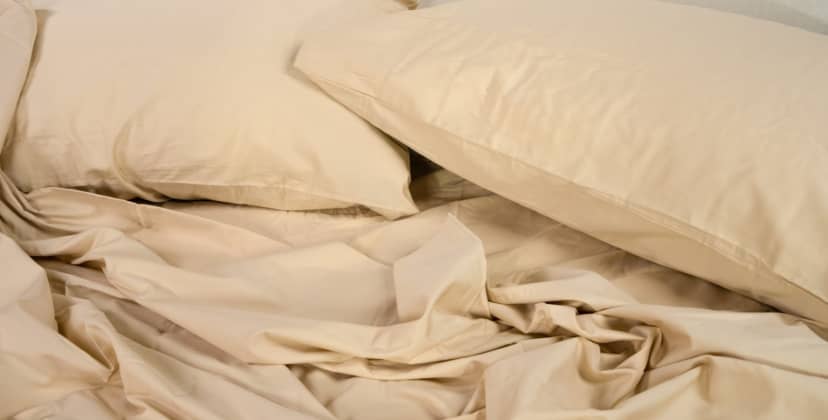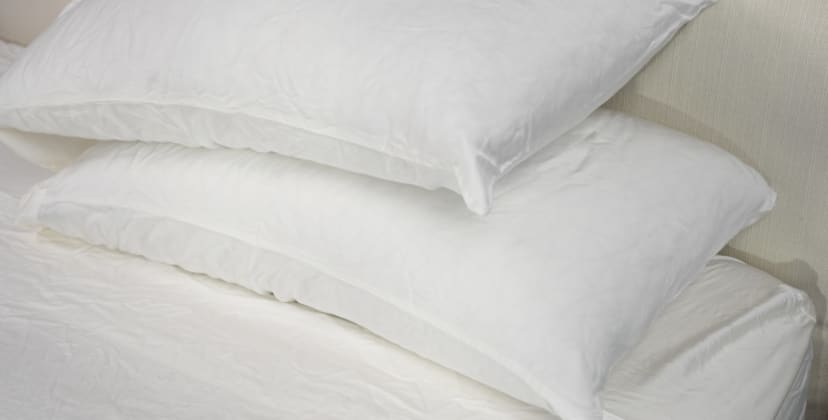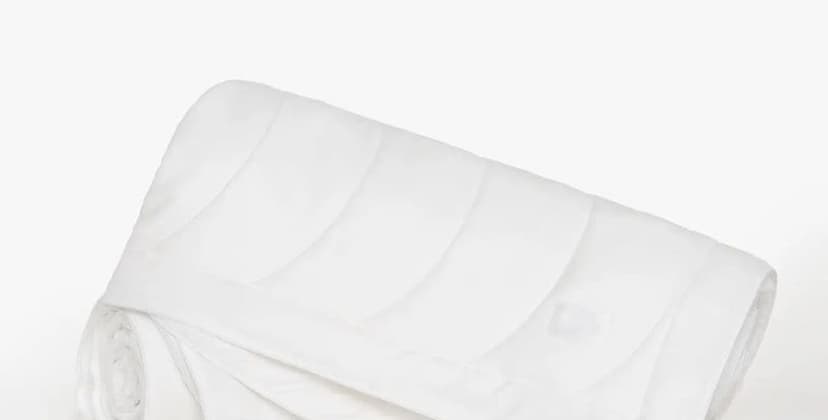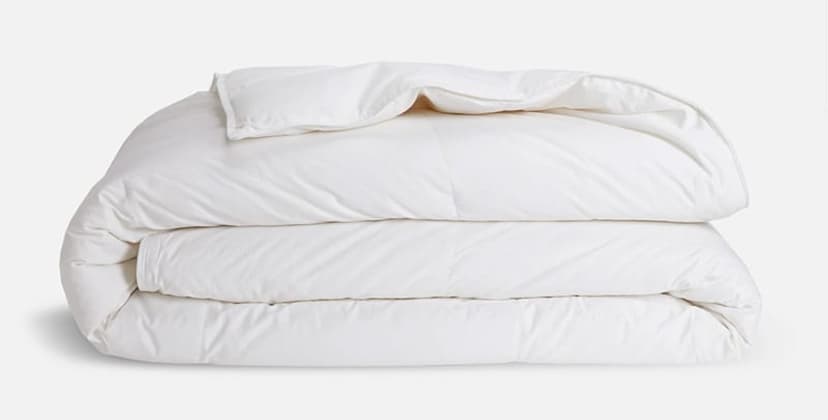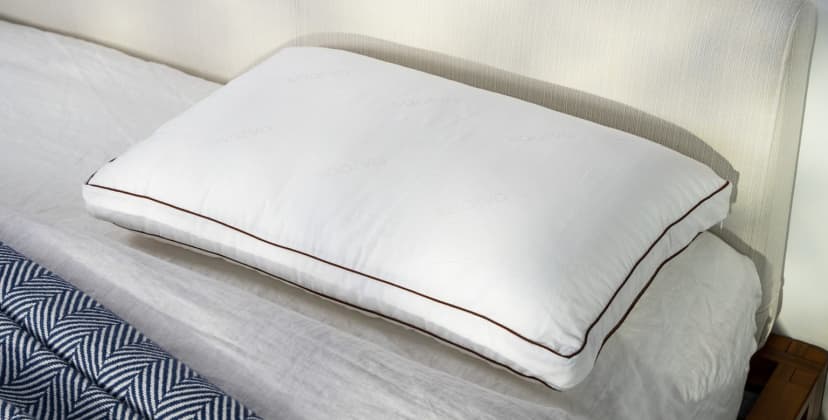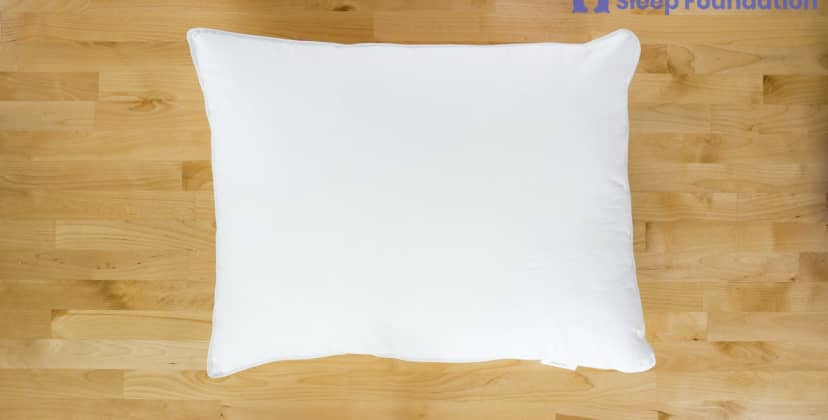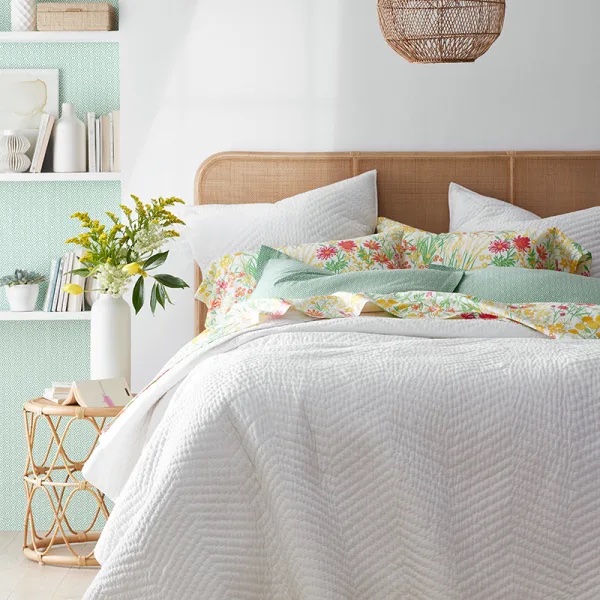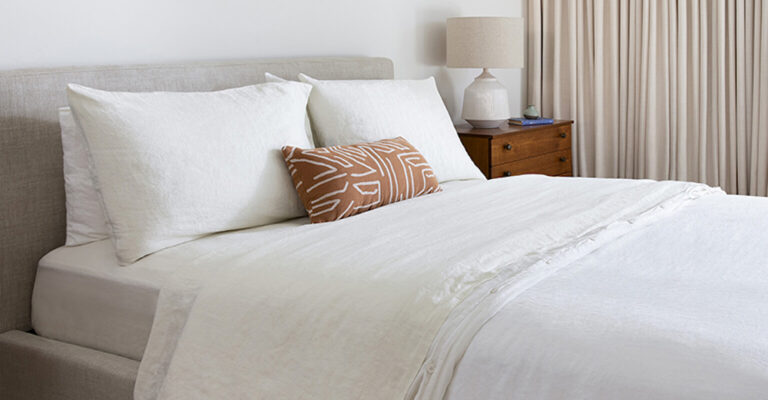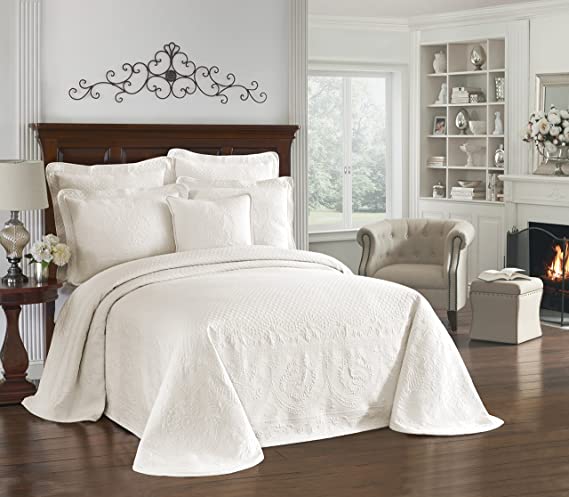When you buy through our links, we may earn a commission. Products or services may be offered by an affiliated entity. Learn more.
The Best Bedding to Improve Your Sleep
Sheets, comforters, and pillows are much more than just a decorative element. The right bedding can contribute to a better night of sleep, while the wrong bedding can keep you tossing and turning. That’s why it’s important to choose bedding made from breathable, comfortable fabrics that are conducive to good sleep.
Today’s shoppers have access to a large range of bedding of various styles and price-points. As a result, shoppers may feel a little intimidated by all the options. We’ll provide a full overview of what to look for when buying bedding. We’ll also share our top picks for sheets, pillows, and comforters to help get you started on your search.
Top Picks Overview
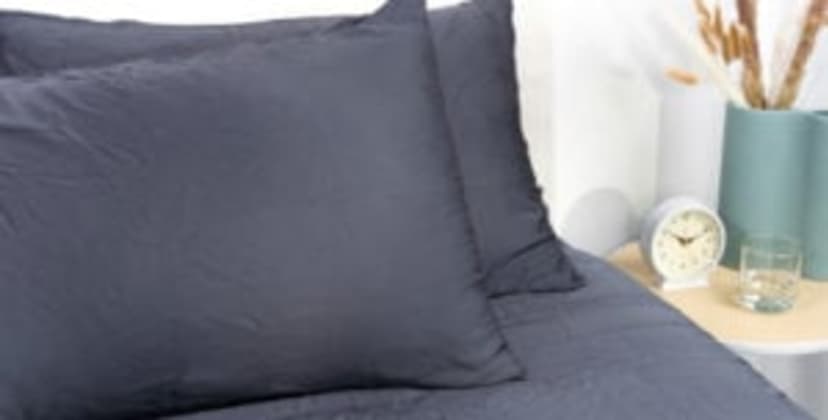
Best Overall Sheets
Luxome Luxury Sheet Set
Shop Now
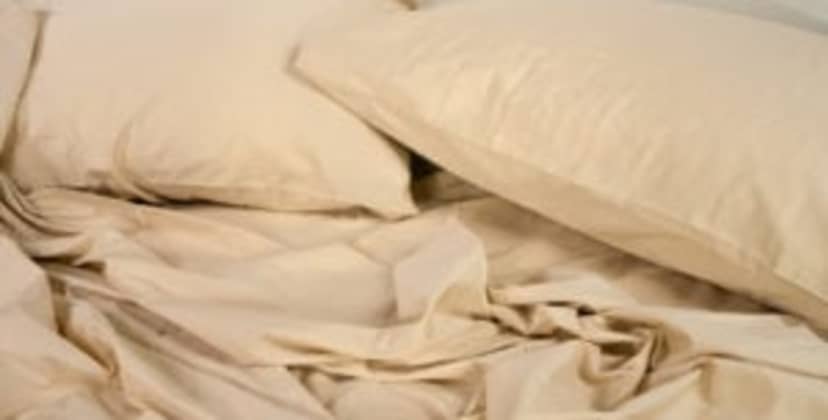
Best Value Sheets
Brooklyn Bedding Deep Pocket Bamboo Cotton Sheets
Shop Now
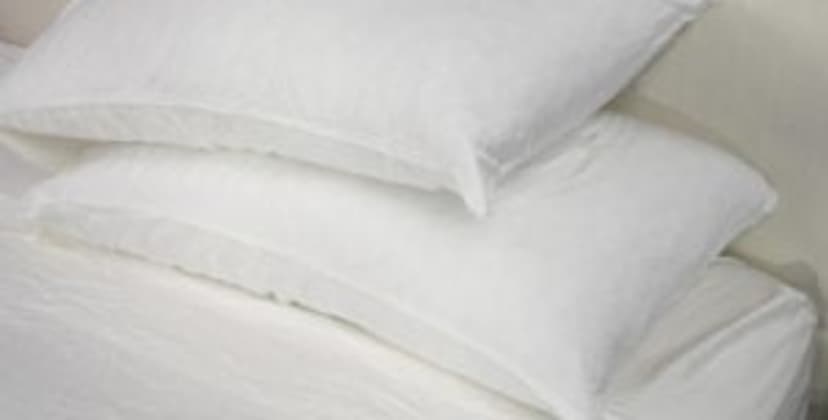
Best Luxury Sheets
Cozy Earth Bamboo Sheet Set
Shop Now
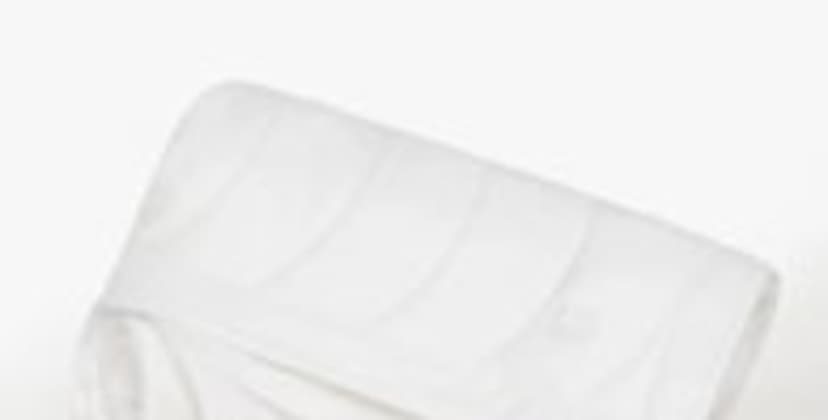
Best Overall Comforter
Buffy Breeze
Shop Now
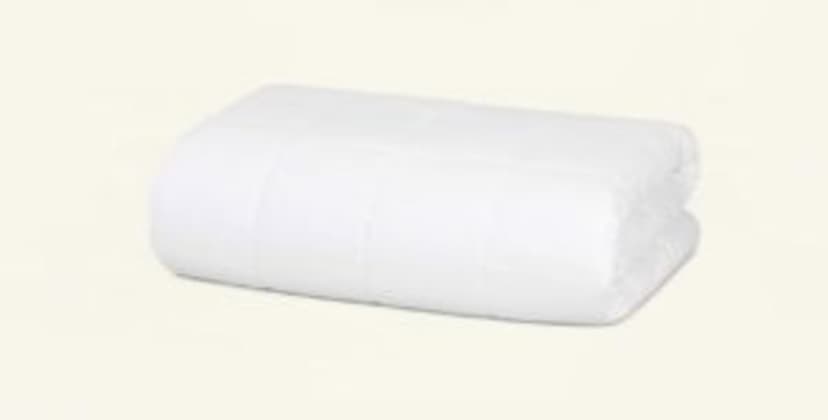
Best Value Comforter
SlumberCloud Lightweight Comforter
Shop Now
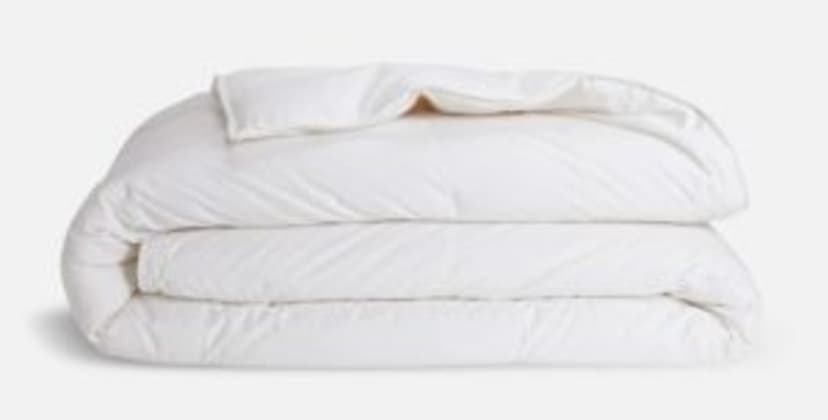
Best Luxury Comforter
Brooklinen Down Comforter – All-Season
Shop Now
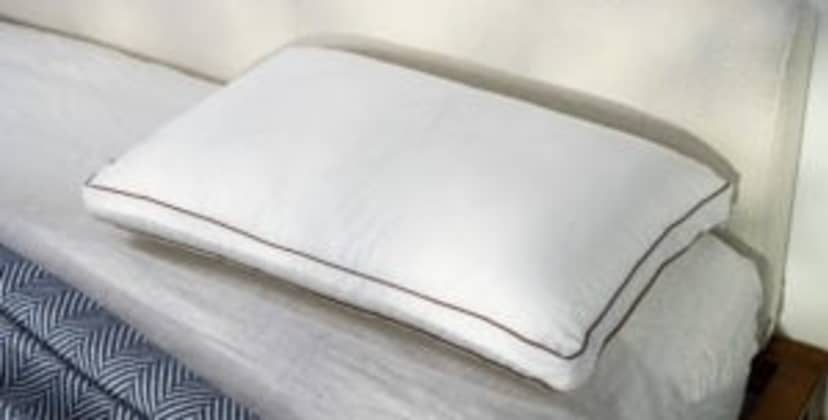
Best Overall Pillow
Saatva Latex Pillow
Shop Now
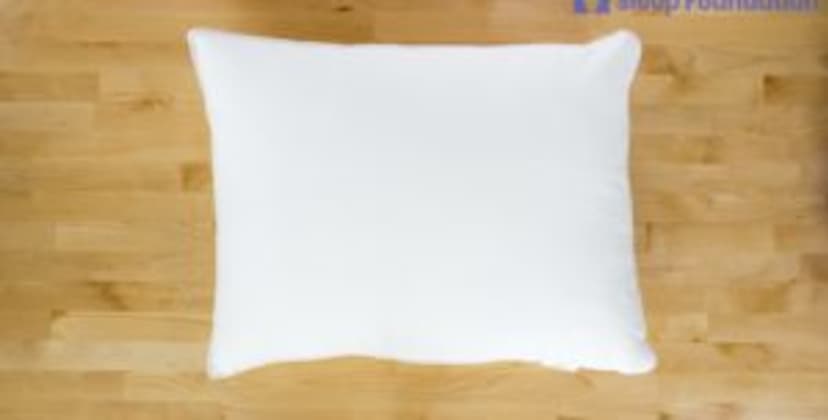
Best Value Pillow
Sweet Zzz Plant-Based Pillow
Shop Now
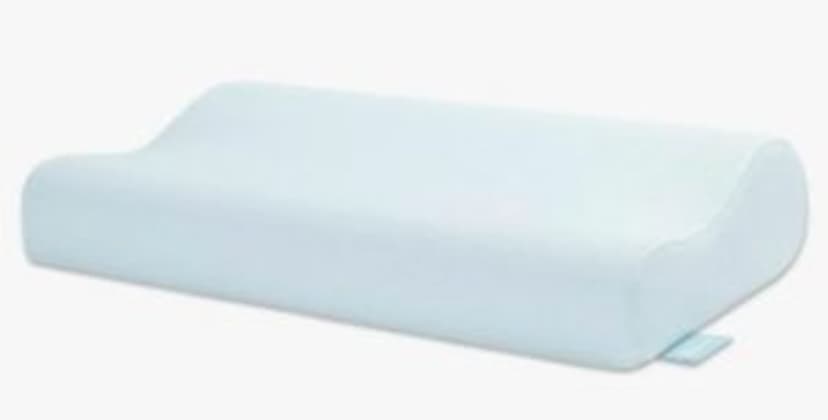
Best Luxury Pillow
Tempur-Pedic TEMPUR-Ergo Cooling Neck Pillow
Shop Now
In-Depth Reviews
Best Overall Sheets
Luxome Luxury Sheet Set
Click the link for the most current Luxome discounts
Shop Now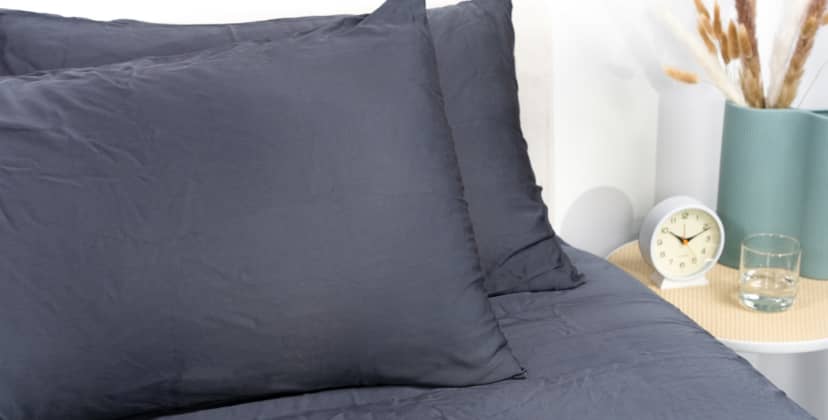
The Luxome Luxury Sheet Set has a lot going for it, from the silky smooth feel to the machine-washable design. The bamboo-derived fabric is also ideal for anyone who overheats easily at night.
Pros
Breathable bamboo-derived viscose construction
Silky sateen weave drapes closely to the body
30-day returns
Cons
Not ideal for sleepers who prefer sheets with a crisp feel
Sateen sheets may be more prone to pilling than other weaves
Price
$170
Material
100% viscose derived from bamboo
Weave
Sateen
Every item in the Luxome Luxury Sheet Set is made from bamboo-derived viscose, a naturally breathable, soft, and moisture-wicking material. These features make the sheet set a great choice for many sleepers, including those who sleep hot or live in warm and humid climates.
The bamboo-derived fabric’s natural softness is enhanced by a sateen weave that gives it a silky feel and lustrous sheen. Our testers with sensitive skin especially loved the sateen weave, finding they could move across the sheets easily without harsh rubbing or irritation.
Six standard sizes are available, as well as a split king size that comes with two fitted sheets. This makes the set a great choice for couples with adjustable beds. All other sizes come with a fitted sheet, flat sheet, and one to two pillowcases. The fitted sheet has a 17-inch pocket depth that accommodates most mattresses in our testing lab. Every item is machine-washable for easy care. Wash in cold water on a gentle cycle, and tumble dry on low heat.
You can choose between eight colors, ranging from neutrals to orange and blue. Luxome ships free to customers living in the contiguous U.S. Returns are accepted for like-new products within 30 days of delivery.
The Brooklyn Bedding Deep Pocket Bamboo Cotton Sheets have a surprisingly approachable price-point given how soft and breathable they feel. Easy machine-washable care really sweetens the deal.
Pros
Ultra-breathable blend of cotton and bamboo-derived rayon
Generous pocket depth can accommodate most mattresses regardless of profile
Available in three colors and seven sizes
Cons
Limited color options compared to some other sheet sets
May feel too silky for sleepers who enjoy bedding with a crisp feel
Price
$159
Material
Cotton and rayon derived from bamboo
Weave
Sateen
High-quality sheets can be somewhat costly, but this isn’t always the case. The Deep Pocket Bamboo Cotton Sheets from Brooklyn Bedding are a prime example of a well-made bedding collection with an approachable price-point. Made from a blend of natural cotton and rayon derived from bamboo, the sheets and pillowcases in this set are quite breathable and well suited to hot sleepers. The fabric is also exceptionally soft and smooth, so the bedding is also a good option for people with sensitive skin.
You can choose from seven sizes. Six correspond with standard mattress dimensions, and you can also select a split king if you and your partner share an adjustable bed. The set is also available in three neutral colors to complement your bedroom decor. A pocket depth of 17 inches makes the fitted sheet compatible with the vast majority of mattresses sold today. To launder the sheets and pillowcases, simply machine wash in cool or warm water and tumble dry on low heat or line dry.
Brooklyn Bedding offers free ground shipping for customers in the contiguous U.S. Your purchase includes a 30-night sleep trial with free return shipping. Should you decide to keep the Deep Pocket Bamboo Cotton Sheets, you’ll receive warranty coverage for 1 year.
If you’re looking to splurge on your next bedding set, the Cozy Earth Bamboo Sheet Set has much to offer. The bamboo-derived viscose feels luxuriously soft and silky, and it’s available in a wide array of attractive colors.
Pros
Breathable bamboo-derived viscose is ideal for hot sleepers
Smoothness of fabric benefits sleepers with sensitive skin
Machine-washable
Cons
Carries an above-average sticker price
Some sleepers may not enjoy the close drape
Price
$308
Material
100% viscose derived from bamboo
Weave
Sateen
The Cozy Earth Bamboo Sheet Set stands apart from other bedding for its luxuriously silky feel. The quality fabric and construction make it a worthwhile investment for those looking to pay a little more for their sheets.
The sheets are composed entirely of viscose derived from bamboo, a fabric known for its soft and lightweight feel. The material excels at regulating temperature and wicking moisture, so the sheets should feel comfortable for those who tend to overheat or sweat a lot at night. You can choose from more than a dozen color options, and each set includes one flat sheet, one fitted sheet, and two pillowcases. The fitted sheet has a pocket depth of 18 inches and can accommodate the vast majority of mattresses on the market.
Due to the fabric’s smoothness, the Cozy Earth Bamboo Sheet Set creates very little friction against the body during sleep. This makes the sheets ideal for those with sensitive skin. The bamboo-derived viscose is also resistant to pilling, enhancing the longevity of the bedding. You may machine wash the sheets in cold water and dry them in a household machine.
You’ll receive a 100-night sleep trial with your purchase and shipping is free. The bedding is backed by a 10-year warranty that protects against pilling and workmanship defects.
The Buffy Breeze has a lofty, lightweight design that offers excellent insulation through most of the year. The eucalyptus-derived material is especially breathable, so it’s a great choice for sleepers who run hot.
Pros
Made of 100% plant-based eucalyptus materials
Lightweight and breathable
Designed to be resistant to allergens
Cons
Cannot be machined washed
Lightweight design may provide insufficient warmth during cold months
Price
$196
Cover Material
Lyocell from eucalyptus
Fill Material
Eucalyptus-based fiber fill
The Buffy Breeze is a lightweight comforter designed for hot sleepers and people in warm climates. The comforter is relatively thin with a low loft, which helps promote airflow to minimize heat buildup.
Both the filling and the cover of the Breeze are made of 100% lyocell derived from eucalyptus. The filling is made from breathable lyocell fiber fill, with wave-stitching throughout that is designed to reduce clumping. The cover is made from durable eucalyptus fabric with a thread count of 300.
The tight weave is intended to help keep out mold, mildew, and other allergens, which may benefit people with allergies or those with sensitive skin. The eucalyptus is sourced from renewable forests in the Czech Republic and Austria and processed with minimal waste. The final product has been certified free of harmful chemicals by OEKO-TEX.
The comforter should be dry cleaned only, but the cover has built-in loops that can be attached to a duvet cover for easier care. The Breeze comes in three sizes: twin/twin XL, full/queen, and king/California king. Buffy ships for free to the U.S. Shipping to Canada may incur an additional fee. Buffy has a 30-day return policy.
Best Value Comforter
Slumber Cloud Lightweight Comforter
Use this SleepFoundation.org link for the most current discount on Slumber Cloud products
Shop Now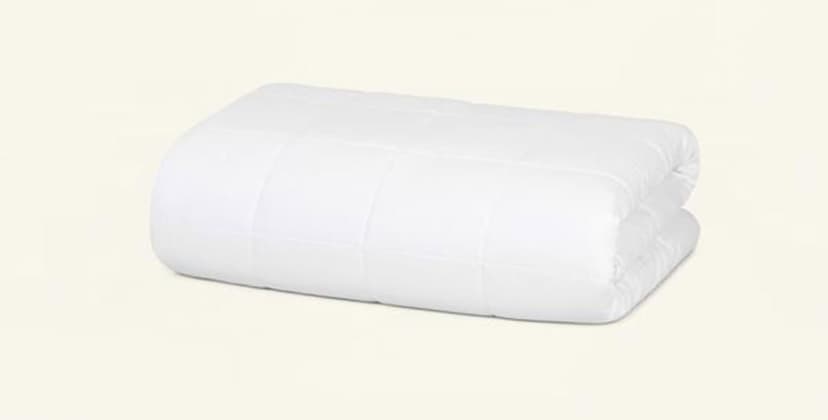
The Slumber Cloud Lightweight Comforter is specifically engineered to help keep you cool. Bedding with specialized cooling features often carries a higher price-point, but this comforter is priced approachably. Even better, you can skip the dry cleaner and machine wash it at home.
Pros
Specialized cooling technology
Soft and breathable cotton cover
Easy to care for and long-lasting
Cons
Sleepers seeking strong insulation may prefer a heavier comforter
Only available in white
Price
$219
Cover Material
100% cotton damask
Fill Material
Polyester down alternative
The Slumber Cloud Lightweight Comforter is made with ClimaDry by Outlast technology, which was originally developed by NASA. This is a type of down alternative fiber fill designed to absorb and disperse heat and wick away moisture from your body. The comforter has a soft, breathable cover made from 300 thread count cotton, and it is OEKO-TEX Standard 100 certified.
The Lightweight Comforter features 12-inch quilt boxing, which helps keep the filling in place. The comforter is only available in white, although Slumber Cloud sells an assortment of duvet covers in different colors. Corner loops allow users to easily attach the comforter to a duvet cover.
Slumber Cloud offers the comforter in twin XL, queen, and king sizes. Unlike most comforters, this one can be machine washed in cold water and machine dried on low heat or line dried.
The comforter ships for free to all 50 states, U.S. territories, and Armed Forces addresses, and can also be purchased in Canada and Mexico. The company offers a 60-day trial period and a 180-day warranty.
The Brooklinen All-Season Down Comforter has a luxuriously plush design that keeps you cozy and warm throughout the year. A generous sleep trial lets you try out the comforter at home for an entire year.
Pros
Fluffy, full-weight traditional comforter
Made with ethically sourced cotton and down
Antimicrobial treatments to help prevent allergen and bacteria buildup
Cons
Price-point may be too high for shoppers on a budget
Not ideal for sleepers who prefer bedding that is not sourced from animals
Price
$379
Cover Material
100% cotton sateen
Fill Material
Down
The Brooklinen All-Season Down Comforter is made from 700 fill power duck down, designed to be comfortable in both summer and winter. The duck down is sourced from Hutterite farms in Canada, and the comforter holds OEKO-TEX Standard 100 certification. The cover of the All-Season Down Comforter is made from long-staple cotton with a sateen weave and a 400 thread count.
The All-Season Comforter is built with baffle box construction, meaning it’s sewn in a checkered pattern to keep the fill in place and prevent bunching. The baffle box design also helps keep the blanket fluffy and warm, while a series of ties helps make it easier to attach to a duvet cover.
The down is treated with antimicrobials designed to keep out bacteria, allergens, and odors. Brooklinen recommends spot cleaning as needed, and dry cleaning only for serious stains. For regular maintenance, the comforter can be air fluffed in the dryer without heat, or hung outside if weather permits.
The All-Season Down Comforter ships for free to the U.S. It is backed by a 1-year sleep trial and 2-year warranty against manufacturing defects such as fraying or tearing. Brooklinen sells a Lightweight Comforter designed for warmer climates, as well as a Down Alternative Comforter for those who prefer to avoid the use of animal products.
The Saatva Latex Pillow comes in two loft options, making it a great fit for a wide array of sleepers. Regardless of the loft you choose, the shredded latex cradles your head and neck without sacrificing support.
Pros
Shredded latex and down alternative fill creates a plush, squishy surface for your head and neck
Available in two loft levels to accommodate different sleep positions
Cover made of soft, breathable organic cotton
Cons
Not suitable for sleepers with a latex allergy
Too thick for stomach sleepers
Price Range
$165 – $185
Fill
Shredded Talalay latex and down alternative
Firmness
Medium Soft
The Saatva Latex Pillow should appeal to a wide range of sleepers thanks to its versatile design and balanced feel. Shredded latex and down alternative clusters make the pillow both plush and adaptive, and neither of these materials retains much heat. You’ll also notice gentle contouring, which may be appealing if you aren’t a fan of memory foam’s “hugging” effect.
A breathable organic cotton cover encases the fill. Two loft levels are available. We recommend the lower loft of 4 to 5 inches if you sleep on your back or stomach, or are a combination sleeper who uses both of these positions. The higher loft of 6 to 7 inches should provide ample cushioning for side sleepers, many of whom need thicker pillows to ensure even alignment and minimal pressure in the neck and shoulders.
You can machine wash the cover and the pouch containing the down alternative fibers, making the pillow exceptionally easy to keep clean. Customers choose between queen and king sizes, and may add a pair of cotton sateen pillowcases to their order for an additional fee. Saatva offers free ground shipping within the contiguous U.S. Your order includes a 45-night trial period, and you’ll also receive a 1-year manufacturer’s warranty if you decide to keep the pillow.
The Sweet Zzz Plant-Based Pillow has the luxuriously plush feel of a down pillow, minus the steep sticker price and animal sourcing. We loved the lofty design and breathability of this pillow.
Pros
Plush, plant-based fibers mimic the lightness and softness of real down
Breathable, natural cotton cover
Inexpensive pricing and a 50-night trial period
Cons
Too thick for most stomach sleepers
May need to fluff frequently to distribute the fill evenly
Price Range
$135 – $150
Fill
Plant-based down alternative fibers
Firmness
Medium
The Sweet Zzz Plant-Based pillow is filled with down alternative fibers derived from botanical matter. This material offers the same loftiness and plushness of real down, but without triggering allergy symptoms or using animal-based components. A cover made of soft natural cotton encases the fill.
The plant-based fibers retain very little body heat and the cover is breathable, so this pillow is well suited to hot sleepers and people who reside in warm or humid climates. The smooth cover and gentle overall feel of this pillow can also be soothing for people with acne, rashes, and other conditions that cause sensitive skin.
Standard and king sizes are available. For cleaning, Sweet Zzz recommends machine washing in cold water on a gentle cycle, then tumble drying on low heat. You should avoid ironing, steam cleaning, and dry cleaning.
The Plant-Based Pillow is affordably priced in both sizes and shipping is free for all orders. Your purchase will include a generous sleep trial that runs 50 nights in length. Returns are accepted during this timeframe as long as the pillow is clean and not damaged. Those who keep the pillow also receive a year of warranty coverage.
Best Luxury Pillow
Tempur-Pedic TEMPUR-Ergo Cooling Neck Pillow
Use this SleepFoundation.org link for the most current discount on Tempur-Pedic pillows
Shop Now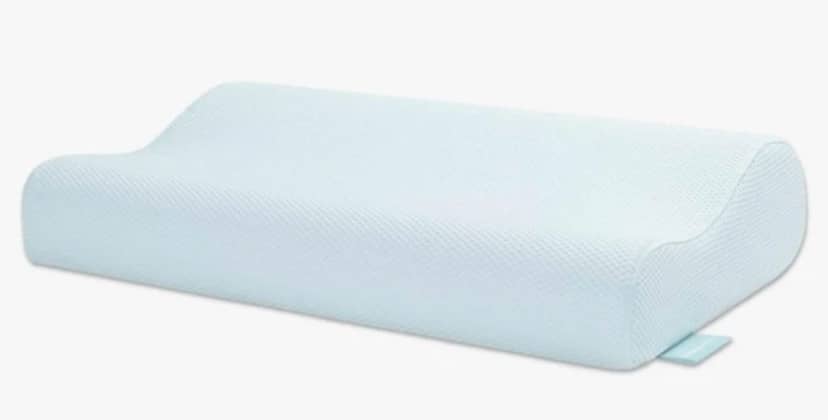
The Tempur-Pedic TEMPUR-Ergo Cooling Neck Pillow is a superior choice for sleepers who need a strong balance of support and cradling from their pillow. The foam conforms closely but still maintains plenty of support to keep your head and neck aligned.
Pros
Ergonomic design for improved spinal alignment
Cooling gel absorbs and disperses heat
TEMPUR memory foam provides contouring pressure relief
Cons
Foam design is prone to heat retention
Cannot be machine washed
Price
$129
Fill
TEMPUR memory foam
Firmness
Firm
The TEMPUR-Ergo Cooling Neck Pillow combines Tempur-Pedic’s trademark memory foam with a highly stretchy and breathable cover. The pillow is responsive and has a medium firmness that contours closely to provide pressure relief.
The pillow has an ergonomic design that is engineered to support the head and neck. With one side slightly higher than the other, it can be used by side sleepers and back sleepers alike. A layer of cooling gel just beneath the cover is designed to help disperse heat and maintain a neutral temperature on the pillow’s surface.
Though the memory foam core should not be immersed in water, the TEMPUR-Ergo Pillow has a removable cover that can be machine washed in a cold cycle with mild detergent. TempurPedic offers free UPS Ground shipping to the 48 continental U.S. states, and to Alaska, Hawaii, Puerto Rico, and other U.S. territories for an additional charge. The pillow is covered under a 5-year limited warranty against manufacturing defects.
In-Depth Bedding Guides
For more personalized bedding recommendations, check out the following pages:
How to Choose Bedding
With such an endless array of products, it can be easy to feel overwhelmed when searching for new bedding. Having a clear idea of what you want can help you narrow down your choices.
What to Consider When Buying Bedding
The bedding industry is rich with vaguely defined buzzwords and misleading claims. While many brands advertise their bedding as being the best, the truth is that bedding is highly individual. Knowing how to evaluate bedding by its materials, quality, feel, and other factors can help you pick items that cater to your personal needs and preferences.
Quality Materials
The quality of the materials used to make bedding can affect how it looks, feels, and costs. You might be able to get an idea about the quality of a given item by examining the thread count, fiber length, density of the fabric, or the source of the raw materials. Recognized third-party certifications for quality and sustainability may also help guide you toward more reputable brands.
Brand Reputation
Though brand names aren’t everything, knowing a company’s reputation is one way to evaluate their products. If you can, take the time to read reliable reviews about bedding products and look into each company’s practices, especially around issues like customer service and returns. If sustainability and worker rights are important to you, seek out companies that are transparent about their policies.
Feel
Depending on factors like material, weave, and thread count, bedding can be smooth, silky, coarse, textured, heavy, lightweight, and anything in between. The type of material is a good place to start when trying to ascertain how an item of bedding is likely to feel. For example, cotton sheets with a percale weave usually feel crisp and breathable, while bamboo-derived lyocell tends to feel sleeker.
Price
The prices for bedding products vary significantly based on the materials used, as well as factors like thread counts and brand names. Although there are plenty of options at every price-point, you may find that special features or more durable constructions will set you back a little more.
Comfort
It goes without saying that you want your bedding to be comfortable. However, what that means varies from person to person. For instance, some people prefer soft, satiny sheets, while others prefer crisp, cool sheets. When selecting bedding, seek out what’s comfortable to you rather than what’s advertised as comfortable.
Design, Color, and Pattern
Bedding tends to set the tone for your bedroom, so try to pick bedding that you will be happy to wake up to every day. If you already have an established look for your bedroom, you may want to restrict your choices to bedding that matches or complements it. For sheets and comforters,don’t forget to consider the way the fabric drapes and how easily it wrinkles.
Breathability and Cooling
Your bedding should be optimized for your sleeping temperature. If you tend to sleep hot, consider more lightweight, breathable bedding, like percale sheets. If you sleep cold, consider warmer, more heavy-duty bedding, like flannel sheets and duvets. Those who run extra hot or cold might consider bedding with cooling or warming features, like warming electric blankets or cooling comforters with phase change material.
Durability
High-quality bedding is usually more durable than lower-quality bedding, which may be more prone to fraying, discoloration, fading, dulling, or pilling. By investing a little more for quality bedding, you may find you need to buy new bedding less often.
Ease of Care
Bedding that is used every night needs to be regularly washed, so ease of care is an important factor when shopping for new sheets, pillowcases, or blankets. Look for machine washable fabrics or removable covers that can help protect the delicate interiors of pillows and duvets. Pieces that require hand washing or dry cleaning may cost you more time and money over the long run.
Warranty, Returns, and Sleep Trials
You may not know how you’re going to feel about bedding until you sleep on it for a few nights. If you wind up not liking it, you want to be able to easily return it for a refund or store credit. Check if your chosen bedding company offers a sleep trial, and whether they provide full refunds or require customers to cover return shipping or restocking fees. Some companies may also offer a warranty against workmanship and manufacturing defects.
Types of Bedding
Along with your mattress, bedding plays a key role in helping you sleep soundly, so it’s important to choose bedding that is appropriate for your sleeping style. Additional factors to consider when shopping for new bedding include design, cost, availability, and care instructions. We’ll break down the top considerations to keep in mind when shopping for common bedding staples such as sheets, pillows, comforters, and blankets.
Sheets
Sheet sets usually include three basic components: fitted sheets, flat sheets, and pillowcases. Sheets are widely available both online and in brick-and-mortar stores.
Fitted sheets fit snugly against your mattress and are almost always secured with elastic edges. They help protect your mattress and create a softer feel against the skin. Flat sheets go between fitted sheets and blankets to protect your blankets and comforters from body oils and sweat. Pillowcases cover your pillows to help keep them clean and provide a smoother surface to lie on.
Common sheet materials include cotton, linen, silk, polyester, and Tencel. Different materials may be more appropriate depending on whether you primarily value softness, warmth, breathability, price, or durability. Some materials are more prone to wrinkling, pilling, and fading, and others may require more care and attention when washing.
Pillows
The best pillows help cushion your head and neck while you sleep, and they can also be used to support other areas of your body. Some pillows are designed for people who sleep in specific positions, for those with specific conditions such as chronic pain, or for use in specific contexts such as travel or pregnancy.
When choosing a pillow, it’s important to consider whether the firmness, the shape, and the loft are suitable for your preferred sleeping position. Common pillow fillings include conforming and supportive materials such as down, down alternative, memory foam, kapok fibers, buckwheat, and latex. Pillow covers are usually made of fabrics such as cotton, polyester, or Tencel lyocell, and many pillows have removable covers that can be machine washed.
Online and brick-and-mortar retailers offer a wide selection of pillows to choose from.
Comforters
Most comforters are designed for warmth in colder months, although some comforters balance insulation with breathability for year-round use.
Comforters are usually filled with soft materials such as down, polyester fiberfill, cotton batting, or silk, and they may be quilted to keep the filling material from bunching. Their outer covers are made from fabrics like cotton, silk, or polyester. While they are designed to be used as-is, some sleepers choose to add a duvet cover for easier maintenance, as comforters may not fit in a household washing machine.
Quality comforters are relatively expensive, but they are typically built to withstand long-term use. You may be able to find them bundled with a sheet set, or sold individually online or in-store.
Blankets
Blanket is actually an umbrella term that groups together comforters, duvets, quilts, throws, coverlets, waffle blankets, and specialty options like weighted or heated blankets. Accordingly, blankets can be made with wool, cotton, polyester, fleece, or many other materials. Some blankets are thicker and warmer, while others are thinner and more breathable.
Most blankets aren’t designed to be washed regularly, so be sure to read the care instructions before choosing a model. Due to their versatile nature, blankets are one of the most commonly available bedding items and may even be found in stores that don’t specialize in bedding.
Optional Bedding
Though they aren’t strictly necessary for every home, many sleepers find that certain optional bedding pieces can enhance their sleep environment:
- Duvets: Duvets are very similar to comforters. The main difference is that while comforters are generally one quilted piece, duvets consist of two separate pieces: an insert, which contains the filling, and a cover. The removable cover facilitates cleaning, offers more design options, and may eliminate the need for a top sheet. Duvets may also be fluffier and loftier than comforters.
- Weighted Blankets: Weighted blankets are designed to be heavier than regular blankets, typically between 5 pounds and 30 pounds. They may be filled with glass, plastic beads, or similarly weighty materials, and encased in a soft cover. For some people, the feeling of weight may help relieve stress and anxiety.
- Mattress Toppers:Mattress toppers are additional layers of material, usually foam, latex, wool, feathers, or down, that are intended to change the feel of a mattress. They are similar to mattress pads, but tend to be thicker, plusher, and geared more toward providing comfort as opposed to protecting the mattress from spills.
- Mattress Protectors: Mattress protectors are basically waterproof fitted sheets designed to either cover or totally encase a mattress. They are designed to protect mattresses against damage from moisture, bugs, mold, and bodily fluids, which may have the added benefit of maintaining your mattress warranty coverage. Some mattress protectors can form a hermetic seal to protect against bed bug infestations.
- Bed Skirts: Sometimes referred to as dust ruffles, bed skirts are used to cover the area between the end of your mattress and the floor. They are largely decorative, but they can also be useful if you want to prevent dust or conceal storage under your bed.
How Much Does Quality Bedding Cost?
Bedding comes in a wide range of prices. Some products that are more expensive are also higher-quality. However, this is not always the case, and quality bedding can be found at many different price-points.
Sheets
Sheet sets typically run between $50 and $300 for a queen set. Polyester, microfiber, and standard cotton sheets tend to be on the lower end of this range, while viscose, silk, linen, and organic or long-staple cotton are more costly.
Comforters
Quality comforters range from as low as $75 to $400 and above. If you’re on a budget, many synthetic comforters cost around $70 to $100. For $80 to $200, you may find higher-end synthetic comforters, as well as relatively basic down comforters. Higher-quality comforters made with materials like down or eucalyptus may cost more than $250.
Pillows
Pillows typically cost between $40 and $200. Down alternative, polyester fiberfill, and basic memory foam pillows are the most budget-friendly options. More expensive options include buckwheat, down, kapok, and more complex memory foam designs with cooling or other special features.
Blankets
Since there are so many types and sizes of blankets, the price-points vary tremendously. Materials such as cashmere, certain wools, long-staple cottons, and linen tend to be more expensive, while acrylic, polyester, fleece, and regular cottons tend to be less expensive.
Weighted blankets usually cost between $100 to $300, while heated blankets can cost between $30 and $200.
How Often Should Bedding Be Replaced?
Most people don’t think of replacing their bedding until it’s visibly worn down, or even outright unusable. However, bedding should be replaced once you’re unable to get it clean, once it starts feeling uncomfortable against your skin, or once it fails to keep its shape. Buying bedding made from high-quality materials, using covers to protect pillows and duvets, and following the recommended care instructions may help your bedding withstand more wear and tear before reaching this point.
| When To Replace | Signs That It Needs Replacing | How To Prolong Its Lifespan | |
|---|---|---|---|
| Comforters, Duvets, and Thick Blankets | 10-15 Years | Flattening, Clumping, Tearing | Use a removable cover, air out periodically, choose models with double stitching |
| Sheets and Thin Blankets | 2-10 Years | Fading, Fraying, Pilling, Tearing | Wash on gentle cycle in cold water and line dry |
| Pillows | 1-3 Years | Stains, Odors, Flattening, Lumpiness, Lack of Resilience | Follow care instructions, use removable cover |
Frequently Asked Questions About Bedding
Where is the best place to buy bedding?
There are many stores, both online and brick-and-mortar, that offer great bedding selections. In addition to selling through department stores and third-party online retailers, many bedding companies also offer the option to buy products directly from their websites.
How much should I pay for a good bedding set?
Most shoppers can expect to pay at least $200 to $500 for a complete bedding set, including a full sheet set, a duvet or comforter, and a pillow. However, prices can vary widely depending on your budget and preferences. If you opt for additional specialty items like a mattress pad or a weighted blanket, the price will rise accordingly. You may be able to find bundled deals or seasonal discounts that can lower the overall cost.
How do I wash and care for my bedding?
Most sheets, pillowcases, and duvet covers can be machine washed, while comforters and pillows may be dry clean or spot clean only. Check the manufacturer's care instructions before washing your bedding for the first time, as washing and drying instructions depend on the material and make of the product. Wash your bedding regularly to prevent dirt and body oil buildup, and know when it's time to throw old bedding away.
Is organic bedding worth the cost?
Many shoppers feel that the higher price of organic bedding is justified given its benefits for the environment. In addition, organic production often goes hand-in-hand with better durability and a higher-quality feel, as it avoids the use of dyes and harsh chemicals. Make sure that when you buy organic bedding, it is certified as organic through reputable third-party organizations like the Global Organic Textile Standard (GOTS).
Are premium materials like Egyptian cotton worth the cost?
Fabrics made with long-staple fibers, appropriate thread counts and fabric density, and other markers of quality are generally worth the cost as they tend to be softer and more durable.Traditionally, Egyptian cotton referred to a durable fabric made from long-staple or extra-long staple (ELS) cotton with a high thread count. However, some manufacturers use the term Egyptian cotton to try to sell lesser-quality cotton that happens to be grown in Egypt, or cotton that has been woven with double-ply or triple-ply threads that isn't actually soft or strong.Look for sheets made of certified Egyptian cotton and try to buy from companies that are transparent about their materials and production process.

Still have questions?
Our product experts have extensive experience testing just about every sleep product on the market.
Send an email to AskAnExpert@sleepfoundation.org with your questions and we’ll help you find exactly what you’re looking for.

